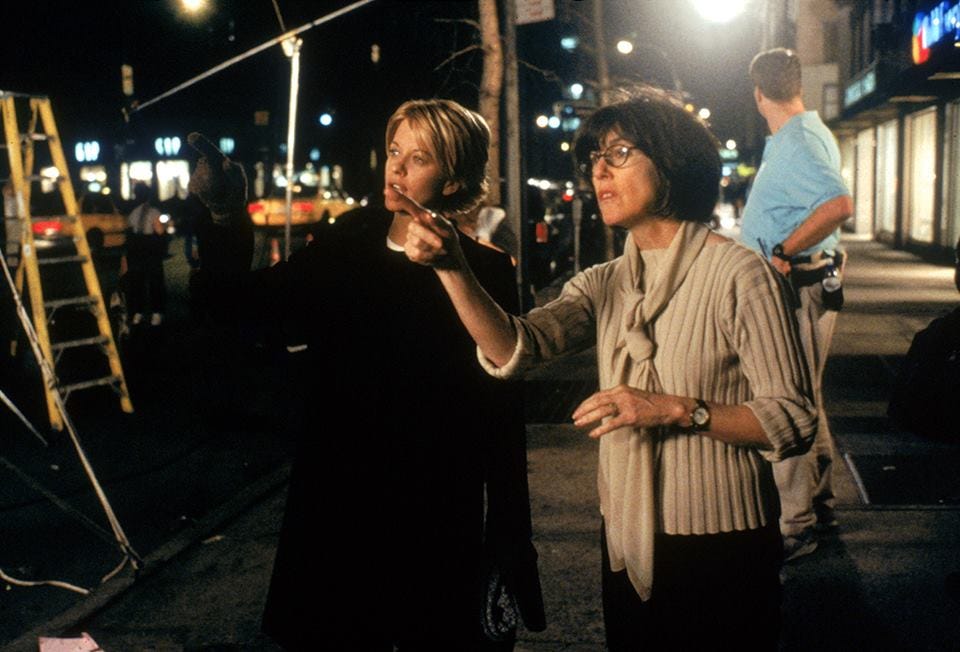Headline Photo by Warner Bros.
The looming presence of the SAG-AFTRA and WGA strikes characterized Hollywood’s autumn, forcing a return to its old classics that embody this transitory season. Even amidst the season’s implications of change and transformation, a constant remains: Nora Ephron’s autumn.
At least once in your life, you’ve encountered the imagery of Nora Ephron—northern autumns, bookstore ventures, meet-cutes and, of course, the Meg Ryan lookbook we all attempt to pay homage to. If you decide to venture beyond this initial encounter, you are met with what makes Nora Ephron’s fans stay for a lifetime. Her intimate writing fosters a connection with a dedicated audience; it comes from her ability to capture the vulnerable experience of falling in love through the most original yet somehow familiar storylines. Her stories live out the dreams of every hopeless romantic but are still realistic as her lines embody the audience’s inner monologue through human experience.
Declarations of love are, selfishly, another staple for Ephron. Who can forget Harry’s words, “I came here tonight because when you realize you want to spend the rest of your life with somebody, you want the rest of your life to start as soon as possible.”
But it also goes beyond declarations of love.
“You’ve Got Mail” captures the fear of not feeling like you’ve lived once for yourself: “Sometimes I wonder about my life. I lead a small life—well, valuable, but small—and sometimes I wonder, do I do it because I like it or because I haven’t been brave?” “When Harry Met Sally” takes familiarity a step further, putting the conversations we’ve had in secret with our closest confidantes into the spotlight through the characters Harry and Sally. The tactics of dating as a straight person are explored through the characters who attempt, but fail, to break the stereotype that “men and women can never be friends.” The overanalysis of characters who become allied to find love for each other provides iconic lines, almost as if Ephron herself eavesdropped in my conversations with my personal allies: “You take someone to the airport, it’s clearly the beginning of the relationship.”
Ephron is the keeper of all of our conversations with those we trust in addition to our inner monologue. It comes as no surprise, as her mother gave the piece of advice to write as if you were writing a letter but tear the salutation off. She embodies the integrity of humanity’s ability to create art that artificial intelligence cannot replace.
Ephron’s world goes beyond being the microcosm of rom-coms’ golden age, finding relevance today. Writer John August — “Big Fish,” “Corpse Bride” — coined the “Nora Ephron Problem” during the WGA strike, attributing the term to the concern that studios could rely on artificial intelligence to create lazy imitations of films by cultural titans like Ephron herself. The problem is that no artificial intelligence system can capture an experience so intimate to the human experience. This is due to its innate nature of being nothing beyond a so-called perfected code, which is finite. Artificial intelligence cannot ‘rip off the salutation,’ for it has no one to write to in that vulnerable way.
Within these films there is an attention to rhetoric and syntax that drives the relationships of characters, something I revere as the regretful non-English or Film Studies major that I am. Rachel Syme writes in her 2022 article featured in The New Yorker, “The idea of swooning over someone’s syntax so dramatically that you change your life appears again and again in Ephron’s work.” It finds its way through Harry’s love of Sally ordering food a specific way, the email exchanges between Kathleen and Joe, and the way Sam speaks on the radio about being a widow which leads Annie to fall in love with his story. It’s a rhetoric that actualizes itself when you find yourself in conversation with that person in real-time; it’s a spoken language that doesn’t need much thought, as, in time with that person, you have finally found the words to describe what you have been feeling all this time.
It’s obvious that AI can never write a love story as it cannot understand love. However, I find myself believing in the possibility of love by selfishly delving into the whys behind this truth. Our love for others is born from the mundane habits and details that we can’t find in anyone else; it goes beyond the grand gestures and is instead found in the moments when you realize your love for someone.
This autumn, look beyond the Pinterest stills of Nora Ephron’s world. Internalize those lines she’s written while spying on your private conversations. Perhaps you’ll find a newfound appreciation or motivation from her work during this new period within the film industry.
- Nora Ephron Autumn: Lessons of Love in a Post-Strike Hollywood - January 28, 2024

